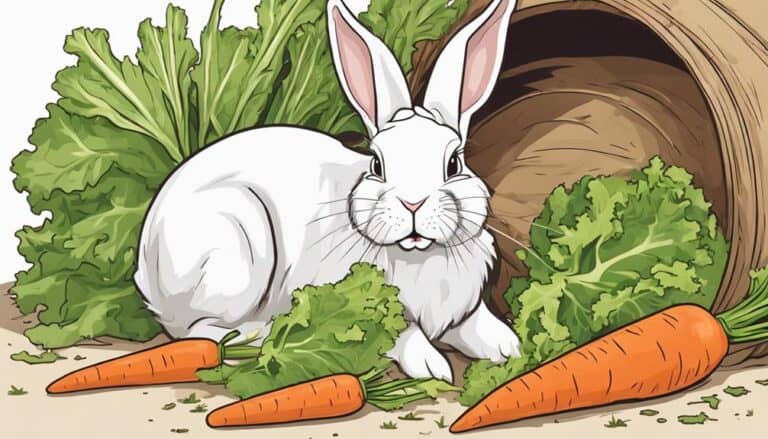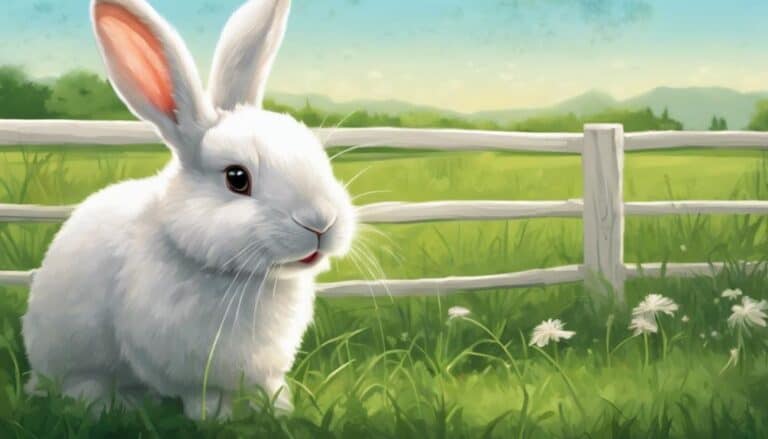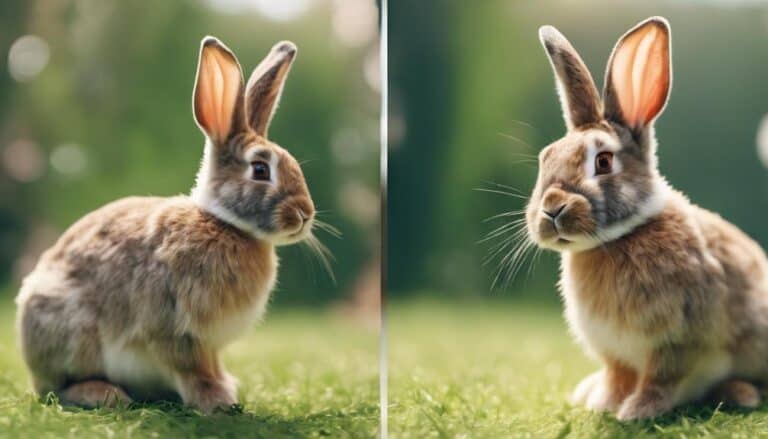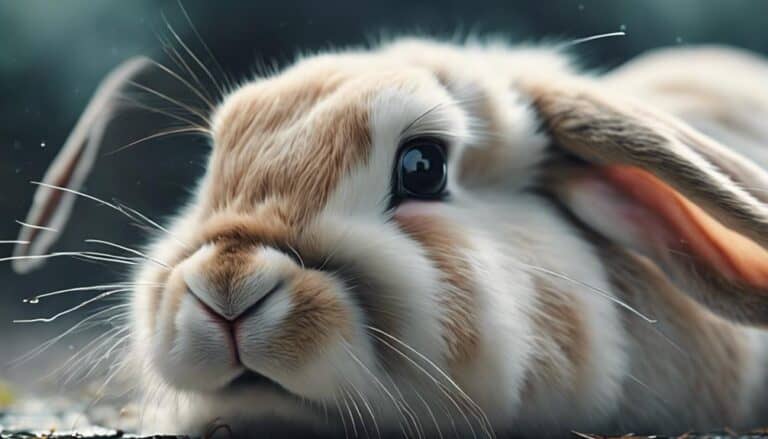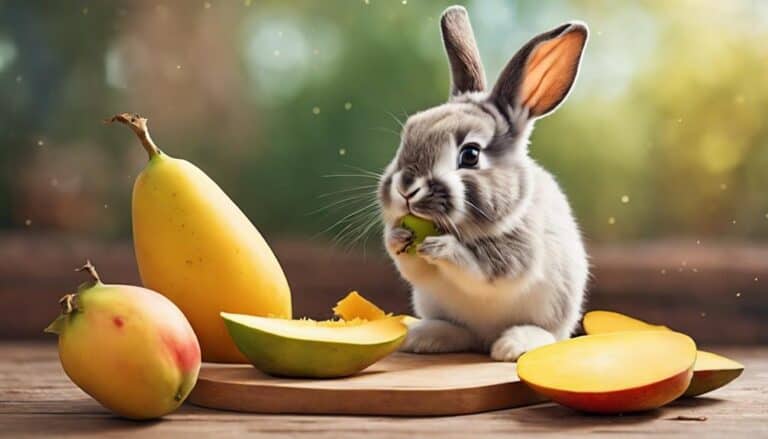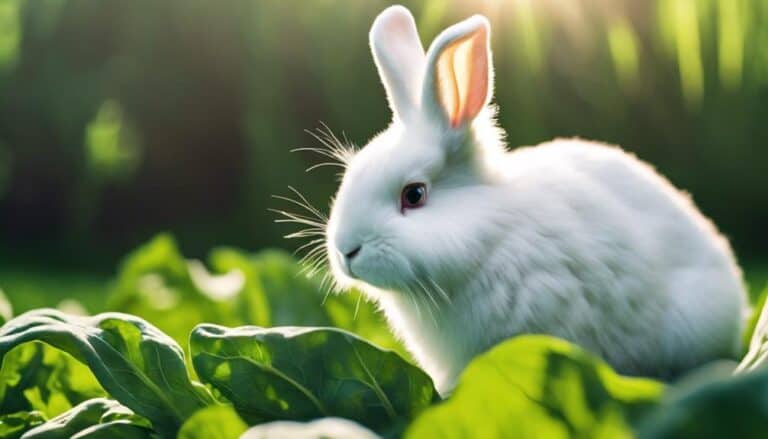Feeding your two-month-old rabbit the wrong diet can lead to health issues later on. So, it's super important to understand what your young rabbit needs to stay healthy and grow strong.
A good diet for a young rabbit is all about balance. You'll want to provide a mix of hay, pellets, and fresh veggies.
Let's start with hay. Hay should make up most of your rabbit's diet. Look for high-quality timothy hay, alfalfa hay, or oat hay. Avoid hay with mold, dust, or pests.
When it comes to pellets, you'll want to choose a high-fiber pellet that's specifically formulated for young rabbits. Avoid pellets with added sugars, artificial ingredients, or a high protein content.
Fresh veggies are also crucial for your rabbit's health. Introduce new veggies gradually to prevent digestive upset. Some safe options include leafy greens like kale, spinach, and collard greens, as well as veggies like carrots, bell peppers, and cucumbers.
Remember, a well-balanced diet is key to your rabbit's development and health. By providing the right foods, you can help your bunny thrive.
Contents
Key Takeaways
So, you're wondering what to feed your two-month-old rabbit.
First, make sure they have access to alfalfa hay and pellets. This combo provides balanced nutrition for your little bunny.
In addition to their regular food, you can offer fresh veggies as occasional treats. Just be sure to introduce them gradually to prevent digestive upset.
It's also important to introduce clean water early on to keep your rabbit hydrated.
Keep an eye on how many pellets your rabbit is eating, as overfeeding can lead to digestive issues.
Finally, around five to six months old, you can start introducing Timothy hay to their diet for a more balanced mix.
Hay and Alfalfa for Nutrition
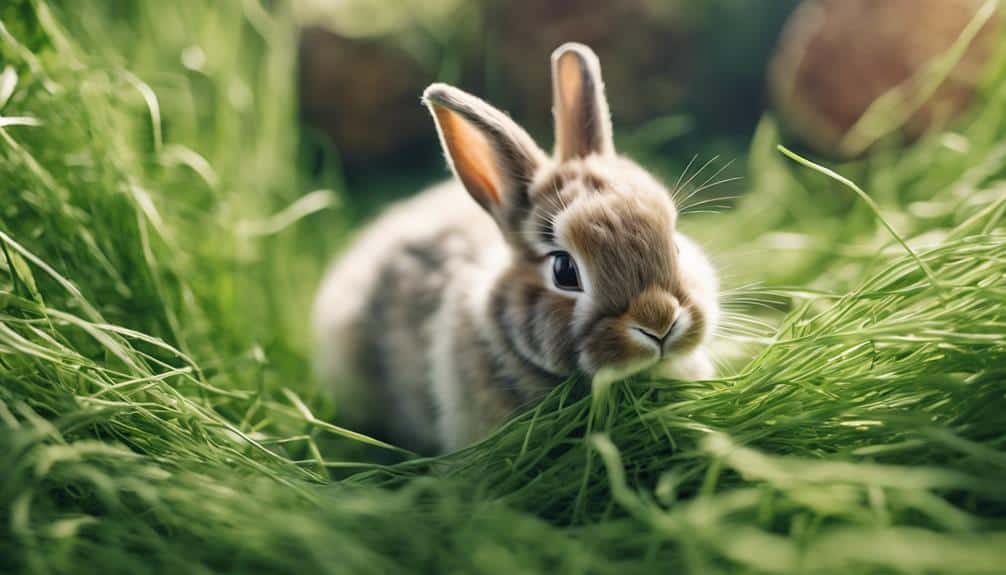
At this age, your two-month-old rabbit still relies heavily on their mother's milk, but they're also starting to get curious about solid food. Around two to three weeks, they'll start nibbling on hay, and alfalfa hay is a great choice because it's packed with protein and calcium, which are essential for growth and development.
When it comes to feeding your rabbit, it's crucial to strike a balance between hay and pellets. Your rabbit should be eating about as much hay as the size of their body every day, and you should introduce fresh food gradually to avoid any digestive issues. Alfalfa hay is super nutritious, but it can also make your rabbit fat, and pellets are even more nutrient-dense. So, you need to keep an eye on how much they're eating and adjust accordingly to prevent overfeeding.
As your rabbit grows, it's a good idea to switch from alfalfa hay to Timothy hay around five to six months old. This will help promote a balanced diet and prevent potential digestive problems. By following these tips, you can ensure your rabbit is getting the nutrients they need to thrive.
Pellets for Balanced Diet
When it comes to feeding your two-month-old rabbit, introducing pellets is a crucial step towards a balanced diet. At this age, they're transitioning from milk to solid food, and these pellets are specifically designed to meet their growing needs. They're usually alfalfa-based, which is perfect for young rabbits.
Start by offering a small amount, about 1/4 cup, and adjust as needed based on your rabbit's eating habits and growth. It's essential to keep an eye on how much they're eating to avoid overfeeding and ensure they're getting a well-rounded diet. Remember, young rabbit pellets are different from adult pellets, which are Timothy-based, so make sure you're giving your rabbit the right type for their age.
To keep your rabbit's digestive system in top shape, try giving them about 1/4 cup of pellets in the morning and 1/8 cup at night. As they get older, you can gradually reduce the amount of pellets to help them produce cecotropes. Just remember, the key to a healthy, happy rabbit is moderation.
Fresh Vegetables as Treats

Fresh veggies can be a great way to add some variety and nutrients to your two-month-old rabbit’s diet. However, it’s essential to choose the right options to ensure their health and digestion are not compromised. Some of the best vegetables for baby rabbits include small amounts of leafy greens like romaine lettuce, cilantro, and parsley. Always introduce new foods gradually and monitor your baby rabbit for any signs of digestive upset.
Just remember to introduce them slowly and in small amounts to make sure their tummy can handle them.
Leafy greens like kale and spinach are super good for your rabbit, so feel free to add those to their menu.
You can also give them carrot tops and dandelion leaves as an occasional treat, just be careful not to overdo it or they might get an upset stomach.
When it comes to fruit, go easy on it because it's high in sugar.
A good rule of thumb is to limit it to 1-2 tablespoons per pound of your rabbit's body weight per day.
Keep a close eye on how your rabbit reacts to different fruits and veggies, and adjust their diet accordingly.
If you pay attention to how they're doing, you can be sure they're getting the nutrients they need to stay healthy and happy.
Introducing Water for Hydration
When it comes to introducing water to your two-month-old rabbit, you want to make sure they're getting enough to stay healthy and happy. Baby rabbits need access to clean water from an early age because it's essential for their growing bodies and digestive systems.
You'll want to keep an eye on how much water they're drinking and gradually increase the amount as they get older. This is crucial for making sure they stay hydrated, which is vital for their overall health.
Hydration Needs
Hydration is crucial for baby rabbits, and they typically start drinking small amounts of water around 3-4 weeks old. As they transition to solid foods, they'll need more water, so make sure they always have access to fresh water. Keep a close eye on their drinking habits, because dehydration can sneak up quickly, especially during weaning.
When introducing water to your baby rabbit, remember that they mightn't know how to drink from a water bottle at first. To avoid accidents, offer water in a shallow dish or bowl instead. This way, they can learn to drink safely and stay hydrated as they start to rely less on their mom's milk.
As you monitor their hydration, remember that adequate water intake is essential for their overall health and well-being. Provide fresh water daily and clean the water bottle or dish regularly to prevent bacterial growth.
Water Intake Importance
So, you want to make sure your two-month-old rabbit is getting enough water. Introducing water gradually and keeping an eye on how much they're drinking is key. As a responsible rabbit owner, providing fresh water is crucial for your baby rabbit's overall health.
Usually, baby rabbits start drinking water around 3-4 weeks old, and they drink more as they start eating hay. Water is essential for a healthy digestive system in rabbits. If your rabbit is eating foods with high moisture content, it's especially important to monitor their water intake.
You should give your rabbit fresh water every day and keep their water bottle or bowl clean to prevent bacterial growth. By adjusting their diet based on what they eat and how much water they drink, you can ensure they stay hydrated and have good digestion.
Monitoring Feeding Schedule
Consistency is key when it comes to your two-month-old rabbit's eating habits. You need to make sure they're getting a balanced diet, mainly consisting of hay and pellets.
At this age, it's essential to introduce new foods gradually. Start with small amounts of fresh leafy greens like kale or spinach when they're around twelve weeks old. Make sure they always have access to unlimited pellets, but limit their daily intake to about an egg cup full to prevent overeating.
Young rabbits can be sensitive to changes in their diet, so keep an eye on their eating habits. You might need to make some adjustments to keep them healthy. Always provide fresh water and observe how much they're drinking, especially when introducing new foods.
A healthy diet for your two-month-old rabbit should be a mix of hay, pellets, and fresh foods. Just make sure pellets don't make up too much of their daily intake, or they mightn't get the balanced nutrition they need.
Transitioning to Adult Rabbit Diet
So, you're wondering how to transition your two-month-old rabbit to an adult diet?
First things first, you'll want to start introducing timothy hay alongside their current alfalfa hay intake. This is a big step in helping your growing bunny make the change to an adult rabbit diet.
Provide unlimited amounts of hay – that's both alfalfa and timothy – to keep their diet balanced. At the same time, make sure to limit the pellets in their diet. You don't want them eating too many pellets, or it could lead to some health issues.
For now, hay and limited pellets should be the main focus. You can start introducing leafy greens around three months old, but don't go overboard just yet.
As your rabbit gets a bit older – between 6 months to 1 year – you can make the complete switch to timothy hay and timothy-based pellets. This will give them a balanced adult rabbit diet.
Conclusion
Hay should be the main staple in their diet. Alfalfa hay is a good option for young rabbits, but you can also offer timothy hay or oat hay. Make sure to provide unlimited amounts of hay to keep them full and happy.
In addition to hay, you can offer limited amounts of high-quality rabbit pellets. These pellets should be formulated specifically for young rabbits and shouldn't make up more than 15% of their diet.
Fresh veggies are also a crucial part of a rabbit's diet. Introduce new veggies gradually to prevent digestive upset. Some safe options for young rabbits include leafy greens like kale, spinach, and collard greens, as well as veggies like carrots, bell peppers, and cucumbers. Aim to provide at least three different veggies daily.
Don't forget to ensure your rabbit always has access to plenty of fresh water. Change their water frequently to keep it clean and fresh.
By providing a balanced diet and monitoring your rabbit's health, you'll be helping them thrive and grow into a happy and healthy adult rabbit.

